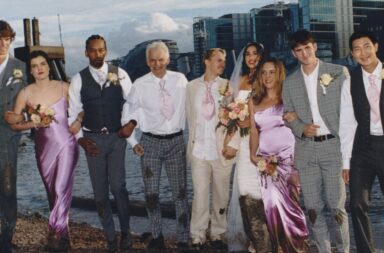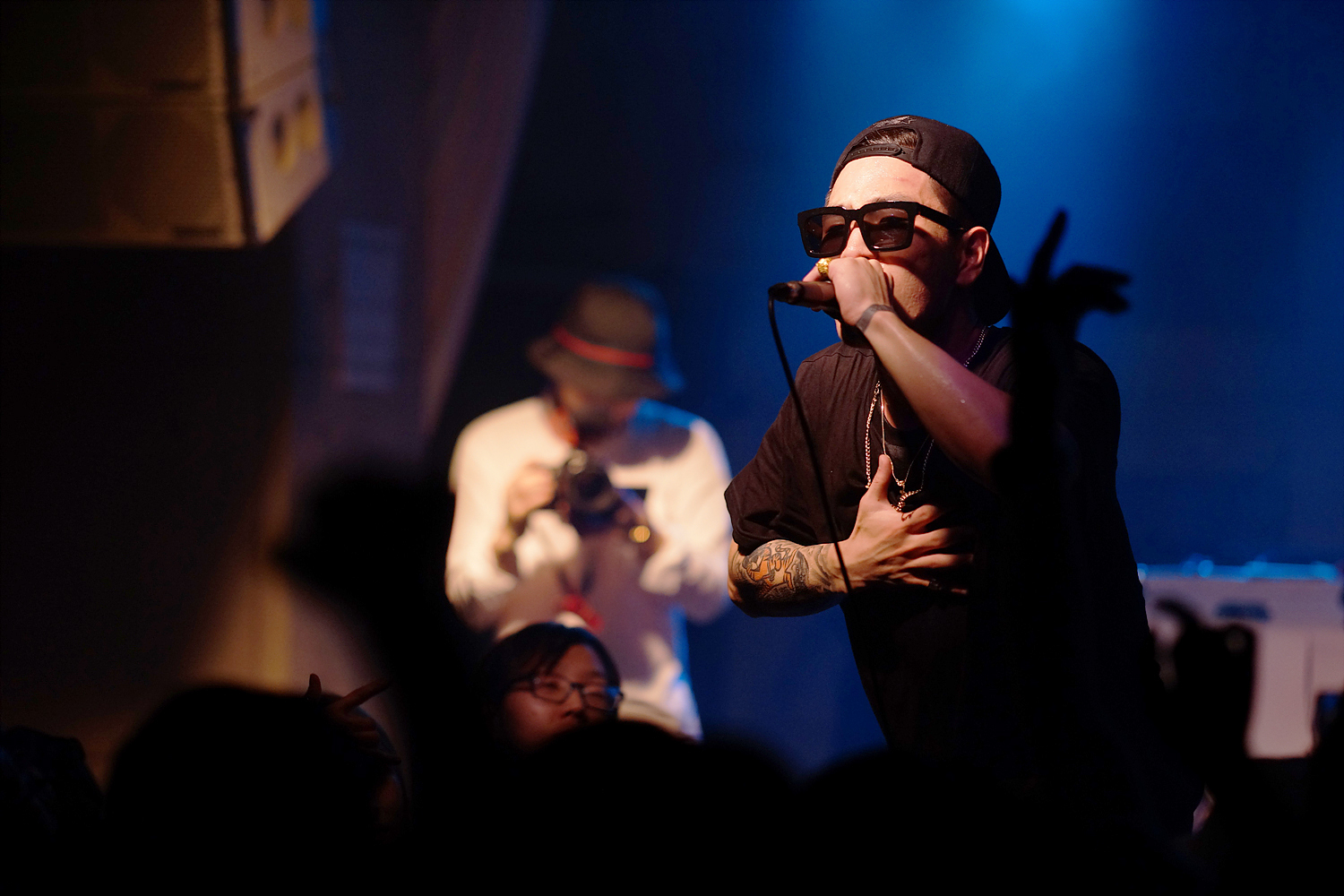
But before we get to that, let’s go back a couple of years to where it all started. On November 21, 2013 at “Kim Bong Hyun’s Hip-Hop Invitational 1st Anniversary Broadcast,” B-Free criticized Rap Monster and Suga — and BTS as a whole — for not being true hip-hop artists, for wearing make-up “like women,” for succumbing to the “temptation” of going mainstream, and for using Kanye West’s “Black Skinhead” as if it were their own song in their concept trailer. He also makes fun of Suga’s stage name and the English abbreviated version of their name, BTS. After all, Bang-tan So-nyeon-dan would technically be BTSND if every letter were accounted for — or BS if we just considered each word — but we see why that didn’t fly. This incited fury among fans, and B-Free never heard the end of it. Fans never forget.
 Though B-Free was rude to BTS during the anniversary broadcast (making fun of someone’s name is a low blow), most of his arguments were valid. His comments are the result of the longstanding tension between the underground hip-hop community and their dedication to music, as well as the highly commoditized nature of mainstream K-pop. His comments also address the societally constructed concepts of masculinity.
Though B-Free was rude to BTS during the anniversary broadcast (making fun of someone’s name is a low blow), most of his arguments were valid. His comments are the result of the longstanding tension between the underground hip-hop community and their dedication to music, as well as the highly commoditized nature of mainstream K-pop. His comments also address the societally constructed concepts of masculinity.
To begin with, in relation to Rap Monster’s assertion that the BTS albums were true hip-hop albums due to the structure of the albums, B-Free commented that albums that contain rap do not make them hip-hop, it’s just “music with rap.” He implies that structure proves nothing of content. This is true. Having the structure of a hip-hop album doesn’t make it a hip-hop album. However, BTS writes songs that seem to run along the vein of the counterculturalism embodied by hip-hop. B-Free probably did not know that BTS were and are actually trying to stay true to hip-hop.
 B-Free also accused BTS of succumbing to the “temptation” of going mainstream due to the lucrative K-pop market and the promise of money, especially since Rap Monster said he was averse to “smokey make-up” and the materialistic image portrayed by idols as a whole, yet he still continued to pursue the idol life. As expressed by Suga, he and Rap Monster left the underground rap community to make a living. Suga “wanted many people to hear [his] voice and music,” and seeks to be a bridging point between the mainstream and the underground. However, especially with the lack of artistic freedom held by K-pop artists and the shiny, potentially “fake” lifestyle they represent, it’s no surprise that the hip-hop artists should be critical of that very suggestion.
B-Free also accused BTS of succumbing to the “temptation” of going mainstream due to the lucrative K-pop market and the promise of money, especially since Rap Monster said he was averse to “smokey make-up” and the materialistic image portrayed by idols as a whole, yet he still continued to pursue the idol life. As expressed by Suga, he and Rap Monster left the underground rap community to make a living. Suga “wanted many people to hear [his] voice and music,” and seeks to be a bridging point between the mainstream and the underground. However, especially with the lack of artistic freedom held by K-pop artists and the shiny, potentially “fake” lifestyle they represent, it’s no surprise that the hip-hop artists should be critical of that very suggestion.
However, there is also the plagiarism controversy in which BTS used a modified version of Kanye’s “Black Skinhead” for their concept trailer and replaced Kanye’s rap with Rap Monster’s. B-Free insists that this action is disrespectful to the original artist. This is valid criticism. As someone unfamiliar with Kanye’s music, I was unaware that BTS had used someone else’s song. After all, the voice rapping is very clearly Rap Monster’s. In this way, it appears as though BTS had taken someone else’s song and used it as their own. In this context, I agree that we have to respect the material of the original creator and clear up copyright issues beforehand. Rap Monster also acknowledged this during the anniversary broadcast.
B-Free also insisted that people who wear makeup are “women.” This is a rude comment, but rather than pinpointing B-Free as a scapegoat of all of the people that think this way, we must keep in mind that B-Free’s perceptions of masculinity are honestly held by a lot of people. Before I knew about stage make-up, I thought that only women put on make-up as well. At the same time, these arguments actually reflect longstanding societal issues: for one thing, why can’t men put on makeup? The association between women and makeup is societally constructed, and this does not make them right.
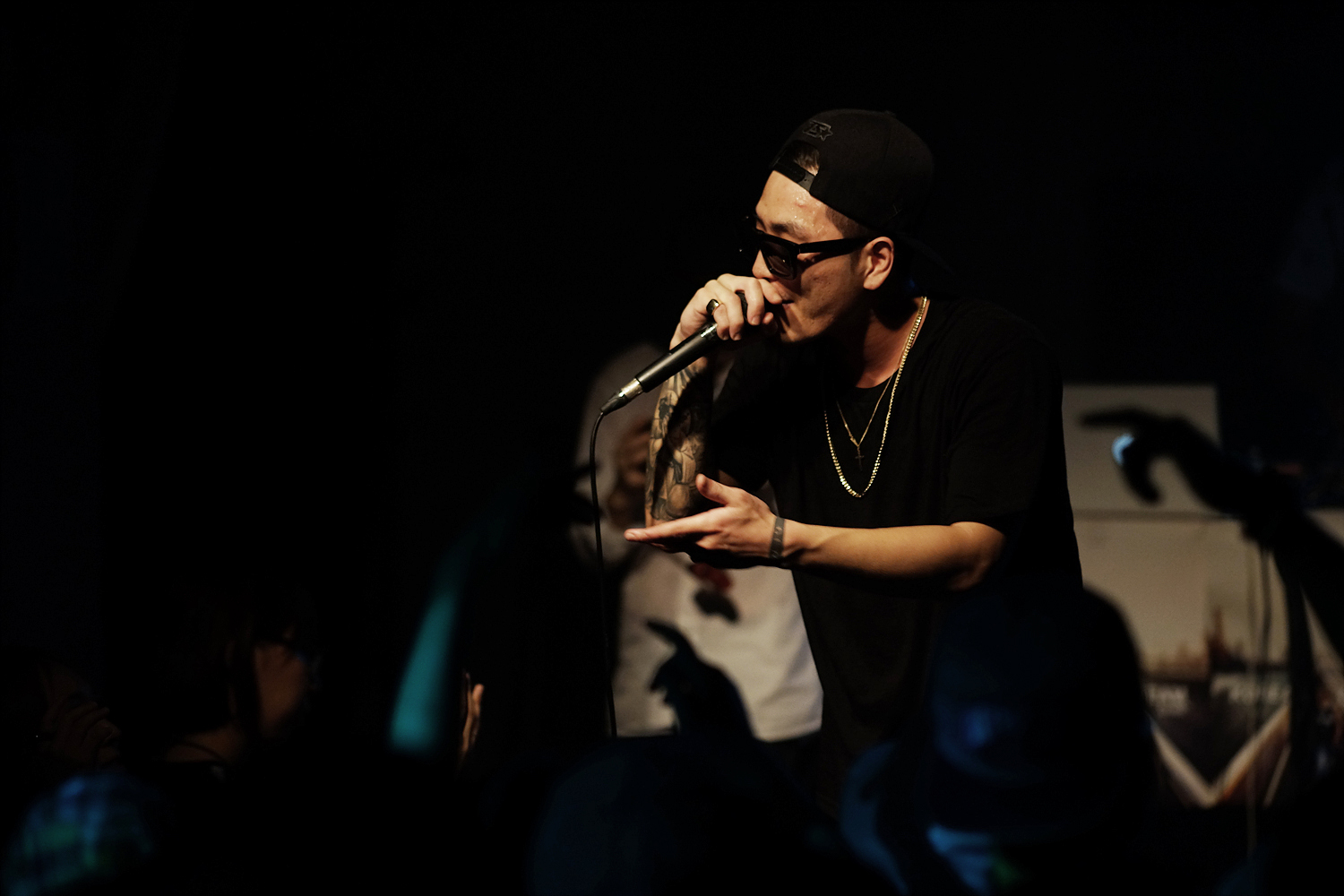
Another problem is the insistence that hip-hop is masculine, as this harkens back to the societally constructed concepts of masculinity and what defines a “true man.” Society as a whole places a strong emphasis on males being “manly” and is highly critical of those that are perceived as “feminine” in any way. These viewpoints cannot be attributed to B-Free alone. At the same time, it does not mean that he is right for saying these things.
These are all problematic perceptions of society as a whole, and we cannot curse at people that think this way. After all, that is how they were brought up. Instead, we have to approach the problem logically and explain to them how they can approach these issues with a more open mind. These societal constructions won’t disappear overnight. They especially won’t disappear if people bash those that don’t understand it without trying to make them reconsider the issue logically. If anything, that will only make them believe that they are right and that everyone else is crazy and illogical.
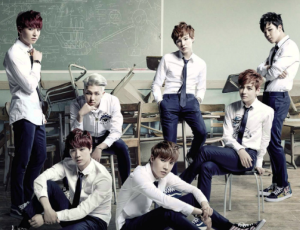 I think that if BTS were to gain respect from the hip-hop community, it would only make sense that they explain themselves thoroughly and prove that they aren’t just sell-outs using the name of hip-hop while not staying to the true spirit of it. Hip-hop in particular is a genre that insists upon a free and true expression of oneself, and placed into the highly regulated K-pop industry, there is a disconnect. B-Free presents himself as one of the few people that is willing to outwardly voice the biases and viewpoints of people that cannot understand why there are people that would — from their perspective — betray the hip-hop scene to be part of the consumer society that they are against. Also, the idol lifestyle seems to turn away from the self-perceived macho-ness of hip-hop, which further contributes to the underground community’s distaste of the idol world. It may be true that B-Free went too far in some of his comments, and he was also quite pushy, but isn’t it better to air out everything once and for all instead of leaving the misunderstandings to brew? He should be commended for his attempts at understanding the idol-rapper mindset, even if he could have went about it in a less abrasive way.
I think that if BTS were to gain respect from the hip-hop community, it would only make sense that they explain themselves thoroughly and prove that they aren’t just sell-outs using the name of hip-hop while not staying to the true spirit of it. Hip-hop in particular is a genre that insists upon a free and true expression of oneself, and placed into the highly regulated K-pop industry, there is a disconnect. B-Free presents himself as one of the few people that is willing to outwardly voice the biases and viewpoints of people that cannot understand why there are people that would — from their perspective — betray the hip-hop scene to be part of the consumer society that they are against. Also, the idol lifestyle seems to turn away from the self-perceived macho-ness of hip-hop, which further contributes to the underground community’s distaste of the idol world. It may be true that B-Free went too far in some of his comments, and he was also quite pushy, but isn’t it better to air out everything once and for all instead of leaving the misunderstandings to brew? He should be commended for his attempts at understanding the idol-rapper mindset, even if he could have went about it in a less abrasive way.
Back to the present day:
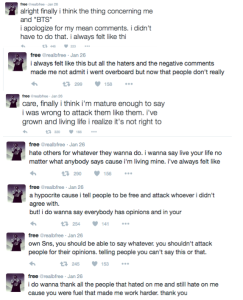 Over two years later, on January 26, 2016, B-Free tweets that he has finally matured enough to admit that he was rude to BTS and wants to put the whole fiasco behind him. Unfortunately, though there were fans that accepted the apology — whether or not they had the right to feel insulted or have the right to accept the apology in the first place is debatable – many fans were critical about the timing and motivation behind the apology.
Over two years later, on January 26, 2016, B-Free tweets that he has finally matured enough to admit that he was rude to BTS and wants to put the whole fiasco behind him. Unfortunately, though there were fans that accepted the apology — whether or not they had the right to feel insulted or have the right to accept the apology in the first place is debatable – many fans were critical about the timing and motivation behind the apology.
After an influx of replies, B-Free responded to his haters by insulting them back. The replies are less than mature, but I suppose they are as mature as the comments that he replied to. But honestly, it’s hard to take people’s curses and not feel the need to defend yourself. At the same time, you make yourself seem as ridiculous as them when you reply in the same manner than they do. If you curse at the person that curses at you, you are typically deemed the immature one instead, especially since you are the public figure and they could be a twelve year-old. It is similar to the golden rule about how you should never punch back the person that punched you first because you typically end up being the one that gets in trouble.
The B-Free front then gets quiet for a few days, but B-Free’s post-apology tweets start up a wave of criticism. Though he deserved the criticism, we should also take into account the fact that the people that cursed at him first were also in the wrong.
On January 30, 2016, B-Free had enough of the hate comments and tweets that the next time he sees BTS, he is going to “bitch slap” them. But, said comment has since been deleted. It appears that he regretted his impulsiveness.

The most interesting and confusing aspect of the apology is that B-Free decided to apologize out of (seemingly) nowhere on his personal Twitter account, and that he addressed the tweet to no one in particular.
One of the recent criticisms B-Free faced was for being a hypocrite because he collaborated with Winner‘s Mino on “Show Me the Money 4.” Subsequently, this could suggest that B-Free only apologized because he wants to collaborate with idol rappers in the future. But even if B-Free’s apology was incited by the fact that he wants to collaborate with idols in the future, isn’t it a good thing that he has decided to get over his prejudices?
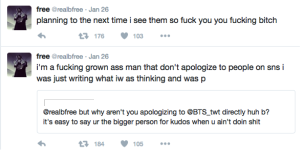 Conversely, like he claimed, perhaps he genuinely felt that the situation had blown over, which thus allowed him to get over his hard-headedness and finally apologize for being rude. And, like he clarified, he may have actually intended to apologize to BTS in person.
Conversely, like he claimed, perhaps he genuinely felt that the situation had blown over, which thus allowed him to get over his hard-headedness and finally apologize for being rude. And, like he clarified, he may have actually intended to apologize to BTS in person.
It is also interesting to consider who this apology was directed towards. He didn’t tag BTS, so it wasn’t directed towards them. Was it directed toward his followers? But who follows him? His fans? His anti-fans?
The tweet may have just been an expression of his sentiments at the time rather than a comment or apology directed toward anyone in particular. Or, it could have been something to appeal to the BTS fans that have been giving him constant flak. As we all know, fans can be scary people, and it’s in everyone’s best interest that the more excitable ones do not get access to anything that might make them more excitable.
B-Free summarizes his dilemma quite adequately:

We seem to expect celebrities to be perfect, and take every opportunity to pick at their flaws. We must remember that they are human beings and they have feelings and flaws just like everyone else. By cursing at his haters, B-Free wanted to address the hate comments without realizing that the real way to go is probably to “kill with kindness.” If you express your vulnerabilities, people will only be given more opportunities to pick at them. On the other hand, if you act with level-headedness, you probably will not be so easily subject to criticism.
The main point is, he apologized, and his apology was well thought-out and logical. Why do we have to suspect that he has ulterior motives? Can’t we give him the benefit of the doubt? Doesn’t the saying go: “Better late than never?” It’s obvious that B-Free is a really prideful person because he responds to his haters and defends himself by insulting other people. Thus, it means that he is taking a large step in apologizing, and we should acknowledge this. Plus, if he is faking an apology for some ulterior motive, he would be going against everything that he stands for. That would be an act to weigh on his own conscience. After all, as a hip-hop artist especially, he prides himself on being true to himself and being free.

Due to the negative comments thrown at B-Free, the tension between him and BTS has only blown up once again. Wedging in between anyone’s relationship is never right, and it’s especially problematic when the issue is between people that you don’t really know that much about. We do not know B-Free or BTS personally, we only know the persona that they show to us as public figures. Therefore, it would be best not to form any solid accusations about things that we will never know everything about.
It seems that B-Free is merely a convenient scapegoat for all of the fan discontent about the criticisms and distaste hip-hop artists — and possibly even the general audience — may harbor towards the K-pop idol image. After all, haven’t we heard a bunch of snide comments from friends and family members that are unable to understand why we watch these shows and listen to songs sung by “effeminate” males? These criticisms of B-Free continue to be fueled by his hotheaded rebuttals that portray him as immature, insincere, and rude. In his defense, the comments on his Twitter were just as rude, but that does not exactly justify his actions.
Also, we should be level-headed in our criticisms of people. B-Free’s initial criticisms of BTS’s decisions to become idols make sense in the context of the societal constructions we were taught to believe in. Perhaps if we thought clearly about the arguments that we disagreed with, we might find that the ideas expressed make sense. In B-Free’s case, we may find his criticisms valid due to his background as an underground hip-hop artist, and his apology apt.
Moreover, we should not be recklessly driven by our emotions, and we should treat human beings as human beings. If someone does something wrong, we should allow them the chance to apologize and redeem themselves. Wouldn’t we want to be given the benefit of the doubt if we made a mistake as well?
(YouTube [1][2], Twitter, PBS [1][2], Psychology Today, NPR, Images via Hi-Lite Records, kick&snap, Bit Hit Entertainment)


